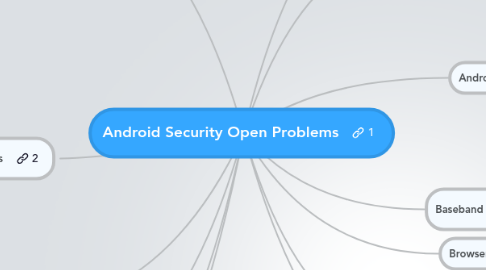
1. Repackaging
1.1. Detecting Piggybacked Code
2. Dynamic Analysis
2.1. Sandbox
2.1.1. Droidbox
2.2. Real-time Monitoring
2.2.1. Taintdroid
2.2.2. Aurasium
2.3. Input Generation
2.3.1. Dynodroid
2.3.1.1. Game Based Malware
2.3.2. Monkey
2.4. Mobile Specific Features
2.4.1. Battery consumption
2.4.2. Data Usage
2.5. Crowdsourcing
2.5.1. Crowdroid
2.6. Open Problems
2.6.1. Bouncer
3. Static Analysis
3.1. Class Dependence
3.1.1. Graph Centrality
3.2. Component Count
3.3. Permissions
3.4. Data Flow
3.4.1. User-Centric Analysis
3.5. Control Flow
3.6. Opcodes
3.6.1. DroidMoss
3.7. Imported Packages
3.8. Market Data
3.9. Analyzing Native Code
3.10. Tools
3.10.1. DroidMat
3.10.2. Androguard
3.11. Open problems?
3.11.1. Hard to separate malicious code from benign
3.11.2. Malware Provenance and Phylogeny
3.11.3. Poor Application Verification
3.11.3.1. Weak Default App Scanner
3.11.3.2. Limitted AV Products
3.11.3.2.1. Anti-malware against Transformation Attacks
3.11.3.3. Partial Solutions
3.11.3.3.1. Acquiring VirusTotal
3.11.3.3.2. Private App Channels
3.11.4. obfuscation
3.11.5. dynamic code loading
3.11.6. limitted availability of tools
4. Malicious Applications
4.1. Rooting Exploits
4.2. SMS Fraud
4.3. Rapid Malware Production
4.3.1. Defeats Signature Based Detection
4.3.2. Malware Phylogeny Could Fight This
4.4. False Notification Attacks
4.5. Response to Malware Detection
4.5.1. Remote Revocation
4.6. Survey of Android Malware
5. Comprehensive Analysis Tools
5.1. Andrubis
5.2. DroidRanger
6. Triage
6.1. Market-scale Mobile Malware Analysis
7. Mobile Botnets
7.1. Epidemic Spread
7.2. Attacking Network Services
7.3. Evasive and Robust P.O.C.
7.4. Tracking Uninfected Devices
8. User Education
8.1. Ignoring Permissions
8.2. Phishing
8.3. Improperly Rooting Devices
8.4. Alternative Markets
9. Browser Attacks
9.1. Phishing
9.2. Click Through
10. Easy to Reverse Engineer Apps
10.1. Adjacking
10.2. Loss of Intellectual Property
10.3. Tools
10.3.1. Apktool
10.3.2. Dex2Jar
10.3.3. Dexdump
11. Android Forensics
11.1. Hiding Data
11.2. Data Mining Personal Information
11.3. Physical Access Attacks
11.3.1. password cracking
11.3.1.1. smudge detection
11.3.1.2. brute force
11.3.1.3. bypass
11.3.2. access data on RAM
11.3.2.1. FROST
11.3.3. survey of attacks
